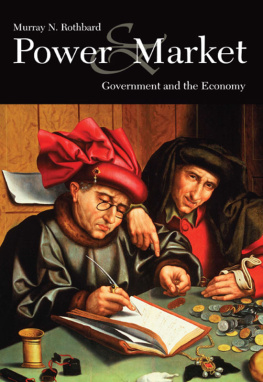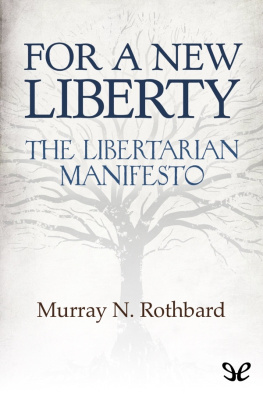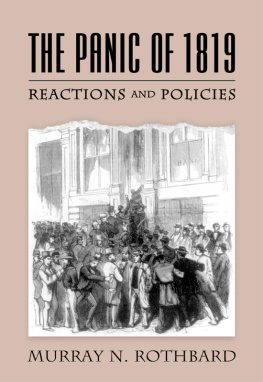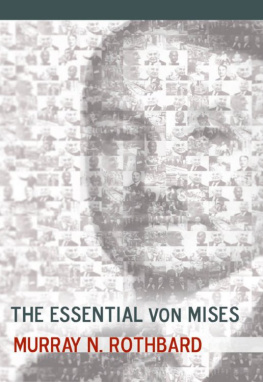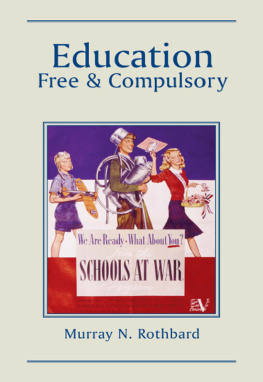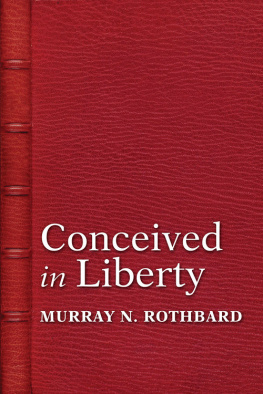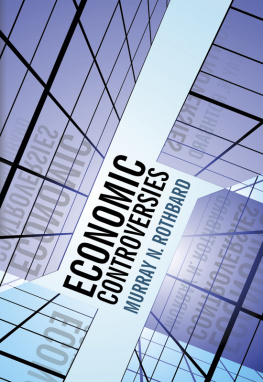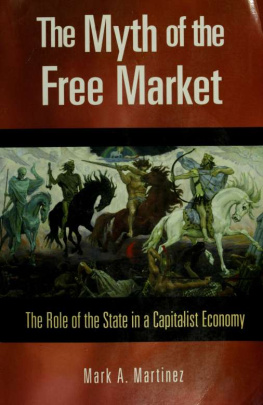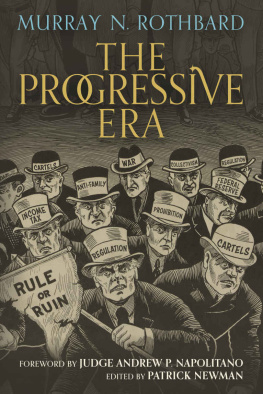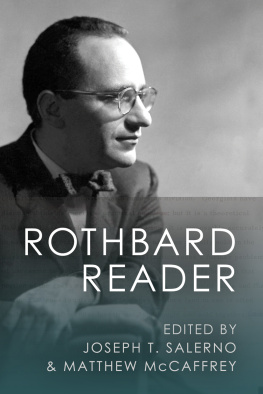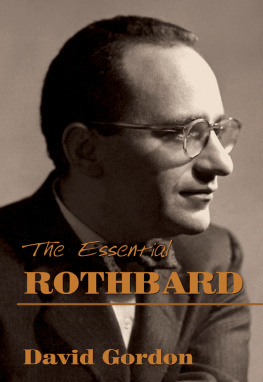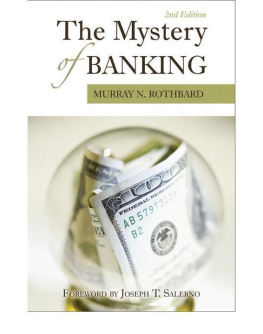POWER & MARKET
GOVERNMENT AND THE ECONOMY
MURRAY N. ROTHBARD
FOURTH EDITION


Front cover: The Money Lenders by Quentin Massys or Metsys (c. 14661530). The picture hangs in the Museo de Bellas Artes, Bilbao, Spain. Permission was obtained from The Bridgeman Art Library (IND54176).
Copyright 1970 by Institute for Humane Studies
Copyright 1977 by Institute for Humane Studies, second edition
Copyright 2004 by Ludwig von Mises Institute, third edition, Scholars Edition, Man, Economy, and State with Power and Market
Copyright 2006 by Ludwig von Mises Institute, fourth edition
All rights reserved. Written permission must be secured from the publisher to use or reproduce any part of this book, except for brief quotations in critical reviews or articles.
Published by the Ludwig von Mises Institute,
518 West Magnolia Avenue, Auburn, Alabama 368324528.
ISBN: 1933550-058
13-Digit ISBN: 9781-93355005-3
To
Ludwig von Mises
CONTENTS
PREFACE TO THE FOURTH EDITION
DIRECTIONS FOR USE: IF YOU hate the state, read this book. If you love the state, read this book! Students, educated laymen, and academics can all profit from Power and Market. In this volume, Murray N. Rothbard uses positive economics to analyze various schemes and proposals to alter or eliminate market outcomes. Where government supporters come up with numerous reasons why government needs to do this or that, Rothbard puts constraints on peoples political fantasies. He shows how the state is not a benign entity that can easily fix problems in the world. Rather, the state is an imperfect and inherently coercive apparatus.
Power and Market, now 35 years after its original publication, is still one of the most systematic economic analyses of government intervention around. Rothbards principles treatise Man, Economy, and State describes the economics of market exchange; Power and Market describes the economics of government intervention.
The central chapters of Power and Market offer a typology and discussion of different types of state intervention. Binary intervention is when the state interferes directly with a private party (e.g., taxes and government spending), and triangular intervention is when the state interferes with the interaction between two third parties (e.g., price controls or product regulations). Are people better off when the state takes their money against their will? Are people better off when the state spends their money on something that they would not have purchased on their own? Are private parties better off when they are prevented from engaging in exchange that they consider mutually beneficial? Hint: The correct answer is no! Read Chapters 3, 4, and 5 to see Rothbards discussion.
Throughout the volume, Rothbard describes how government is not a benign force as many government supporters assume. The government is an institution of coercion that interferes with voluntary relations in the market. Just in case anyone cannot wait to find out how far Rothbard will push the Before Rothbard, even the most free-market theorists such as Ludwig von Mises, Henry Hazlitt, Ayn Rand, and Friedrich Hayek had simply assumed that services like law enforcement must be provided collectively by the state. Rothbard believes that law enforcement must be analyzed in terms of marginal units and, like other goods, those marginal units can be provided privately. He briefly mentions some historical examples of private law enforcement and then speculates how a purely private system could work. Is he being too Utopian? Rothbard responds:
[T]his concept is far more workable than the truly Utopian idea of a strictly limited government, an idea that has never worked historically. And understandably so, for the States built-in monopoly of aggression and inherent absence of free-market checks has enabled it to burst easy any bonds that well-meaning people have tried to place on it.
Rothbards libertarian anarchism influenced many subsequent thinkers, who have since written numerous articles and books on why government is unnecessary.
In Power and Market, no aspect of government intervention is spared. Rothbards arguments should give pause to anyone who wants to solve problems using political means. To Rothbard, the state is not perfect, desirable, or necessary; its quite the opposite! The state, in all of its forms, is injurious to civil society, and if we truly want to improve the world, we must look beyond government. Real solutions lie not in power but in the market.
EDWARD P. STRINGHAM
San Jose State University
May, 2006
_______________
Rothbard originally wrote this volume as the final third of the 1,500-page manuscript for Man, Economy, and State. The length of the manuscript and the nonmainstream political conclusions in his analysis of government were too much for some, however, so Man, Economy, and State and Power and Market were published as separate volumes in 1962 and 1970. See Joseph Stromberg, Introduction to Man, Economy, and State with Power and Market in Murray N. Rothbard Man, Economy, and State with Power and Market, Scholars edition (Auburn, Ala.: Mises Institute, 2004), pp. lxvlxxi.
Rothbard, p. 251.
The public choice economists views on government and anarchy are presented in Edward Stringham, ed., Anarchy, State, and Public Choice (Cheltenham, U.K.: Edward Elgar, 2006).
Murray Rothbard, Power and Market (Kansas City: Sheed Andrews and McMeel, 1970), p. vi.
Rothbard, p. 9.
See for example: Randy Barnett, The Structure of Liberty: Justice and the Rule of Law (Oxford: Clarendon Press, 1998); Bruce Benson, The Enterprise of Law: Justice Without the State (San Francisco: Pacific Research Institute for Public Policy, 1990); idem, To Serve and Protect: Privatization and Community in Criminal Justice (New York: New York University Press, 1998); Hans-Hermann Hoppe, Theory of Socialism and Capitalism (Boston: Kluwer, 1989); idem, DemocracyThe God That Failed: The Economic and Politics of Monarchy, Democracy, and Natural Order (New Brunswick, N.J.: Transaction Publishers, 2001); idem, ed., The Myth of National Defense: Essays on the Theory and History of Security Production (Auburn, Ala.: Mises Institute, 2003); Anthony de Jasay, Against Politics: On Government, Anarchy, and Order (London: Routledge, 1997); Edward Stringham, ed., Anarchy, State, and Public Choice (Cheltenham, U.K.: Edward Elgar Publishing, 2006); and idem, ed., Anarchy and the Law: The Political Economy of Choice (New Brunswick, N.J.: Transaction Publishers, 2006).
Richard H. Thaler and Cass R. Sunstein, Libertarian Paternalism, American Economic Review 93, no. 2 (May 2003): 17579.
Rothbard, p. 254.
See Martin C. McGuire and Mancur olson, The Economics of Autocracy and Majority Rule: The Invisible Hand and the Use of Force, Journal of Economic Literature 34, no. 1 (March 1996): 7296, and the arguments by the public choice economists in Edward Stringham, ed., Anarchy, State, and Public Choice (Cheltenham, U.K.: Edward Elgar Publishing, 2006).
Rothbard, p. 260. See also Benjamin Powell and Christopher Coyne, Do Pessimistic Assumptions About Human Behavior Justify Government?

